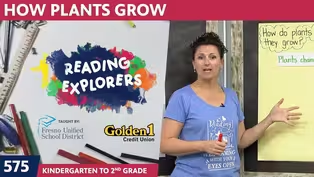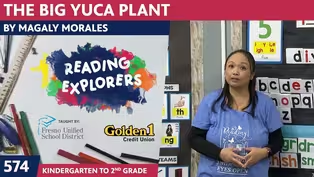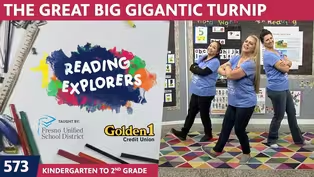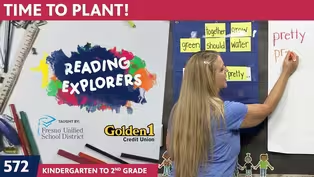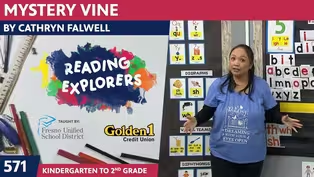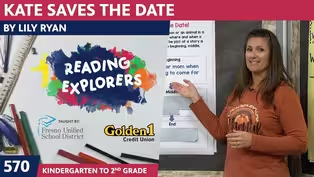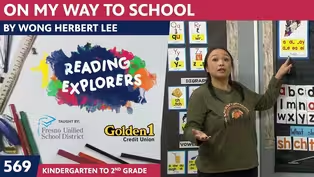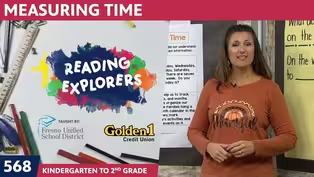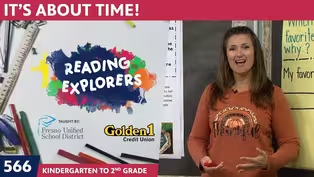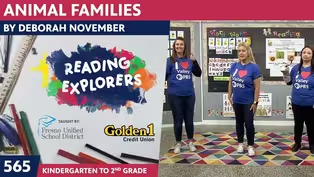
3-342: Adding the Inflectional Endings 's' 'es' 'ed' & 'ing'
Season 3 Episode 232 | 14m 17sVideo has Closed Captions
Join Mrs. Nix at Camp Discovery!
Third Grade teacher, Mrs. Nix, welcomes students back to Camp Discovery, a fun learning space packed with reading adventures & fun games!
Problems playing video? | Closed Captioning Feedback
Problems playing video? | Closed Captioning Feedback
Reading Explorers is a local public television program presented by Valley PBS

3-342: Adding the Inflectional Endings 's' 'es' 'ed' & 'ing'
Season 3 Episode 232 | 14m 17sVideo has Closed Captions
Third Grade teacher, Mrs. Nix, welcomes students back to Camp Discovery, a fun learning space packed with reading adventures & fun games!
Problems playing video? | Closed Captioning Feedback
How to Watch Reading Explorers
Reading Explorers is available to stream on pbs.org and the free PBS App, available on iPhone, Apple TV, Android TV, Android smartphones, Amazon Fire TV, Amazon Fire Tablet, Roku, Samsung Smart TV, and Vizio.
Providing Support for PBS.org
Learn Moreabout PBS online sponsorshipMore from This Collection
Valley PBS and Fresno Unified School District have partnered with Golden 1 Credit Union to create Reading Explorers Lessons for grades Pre-Kindergarten through Third grade. The daily lessons will be taught by Fresno Unified School District teachers and are created to help students practice their reading skills and reinforce lessons during distance learning.
Video has Closed Captions
Learn about the life cycle of a plant on Reading Explorers. (26m 39s)
K-2-574: The Big Yuca Plant by Magaly Morales
Video has Closed Captions
Join the Reading Explorers as we adventure into a new book The Big Yuca Plant. (26m 30s)
K-2-573: The Great Big Gigantic Turnip
Video has Closed Captions
What will happen at The Great Big Gigantic Turnip? (26m 30s)
K-2-571: Mystery Vine by Cathryn Falwell
Video has Closed Captions
The Bell has rung and the Valley PBS Classroom is open once more. (26m 32s)
K-2-570: Kate Saves The Date by Lily Ryan
Video has Closed Captions
Mrs. Nix, Mrs. Hammack and Mrs. Vang are glad to have you join her for a new day. (26m 32s)
K-2-569: On My Way To School by Wong Herbert Lee
Video has Closed Captions
Mrs. Vang is ready for a new day of phonemic awareness and reading comprehension. (26m 40s)
Video has Closed Captions
We review phonics, frequency words and more on Reading Explorers. (26m 45s)
K-2-567: Nate The Snake Is Late
Video has Closed Captions
What happens when Nate the Snake is late to school? (26m 49s)
Video has Closed Captions
It's time for school! How do you know what time it is? (26m 31s)
K-2-565: Animal Families by Deborah November
Video has Closed Captions
Welcome to the Reading Explorers lessons in the Valley PBS Classroom. (26m 14s)
K-2-564: From Caterpillar To Butterfly
Video has Closed Captions
The transformation from Caterpillar to Butterfly is a special one. (26m 52s)
Providing Support for PBS.org
Learn Moreabout PBS online sponsorship(guitar music) ♪ Good morning to a brand new day ♪ ♪ Time to learn and games to play ♪ ♪ Learning things is so much fun ♪ ♪ Learning is good for everyone ♪ (guitar music) (bright upbeat music) - I wonder what I should read today.
Hi, hey, third grade, it's Mrs. Nix, I am so excited to be here with you and support you as you become amazing thinkers, readers and writers.
I was just checking out our Sora app and trying to decide what fun book I'd like to read.
Are you reading something really good right now?
I'd love to hear about it.
You know what you could do?
You could send me an email or a letter, to the address that's gonna pop up right there at the bottom of your screen, And tell me about it.
What is it that you're reading?
I love hearing about what you are learning about.
If you do that, I'll make sure that I put in the mail for you a free copy of the super fun activity book.
It's full of puzzles and mystery pages, dot-to-dots, all sorts of fun activities.
Third grade, speaking of reading, if you're looking for a great book to read, there's a couple of places that I recommend.
One would be your county library, you can always check out a good book through them.
And here in Fresno Unified, we use the Sora app to help us find some really great, fantastic books.
And they're right there at your fingertips.
Now, we also love to celebrate out schools who are checking out books using the Sora app.
And we count down the top five schools that have checked out books from last week.
So in fourth place, this week, we have Jackson Elementary, so great job, Jackson.
You guys are doing a fantastic job of checking out your books.
Now, if you would love to have your school up here on our poster, our little shout out board, it's super easy.
All you need to do is check out a book and maybe tell a classmate or two, and they can join you.
Awesome job.
Third grade I have three things we're gonna go through today.
The first being that we're gonna talk about inflectional endings, we're gonna look at suffixes, and then we're gonna finish off our day, with homophones.
Are you ready to start?
Let's start by warming up those super smart brains of yours and look at our high frequency words.
Now remember, these are those words we come across often in our reading and writing, and so we wanna make sure that we're able to not only able to read them, but to write them.
So if there's one today that you see that you want a little extra practice with, remember, you're responsible for your learning success.
So write those down and practice them.
You'll have it by the end of the week, I know that.
You read them big and loud at home.
I'll read them down here in the studio.
Let's go together, ready?
Work, would, word, with, wish, will, who, why, white, which, nicely done.
Now I have two words we're gonna practice today.
So we have word which is w, o, r, d, and with, w, i, t, h. Help me use them in a couple of sentences.
Can you think of another, hmm for sad?
And do you need help, hmm the dishes?
Do you need help word the dishes?
That doesn't make sense.
Do you need help with the dishes?
Ooh, I could always use some help with the dishes.
And can you think of another word for said?
Do you ever hear your teachers telling you that can you think of some other words for said?
It's a great thing.
Let's get started with those inflectional endings.
Now remember, inflectional endings, it's making the word plural, we're adding the letter s, it's making that word be a past tense by adding ed or present tense and adding the ing.
So it's adding s, adding ed or adding ing to a word.
And there were some things we've been practicing over the last few weeks, and this is kind of that review week where we're gonna go through and remember some of our rules.
So when I have a word like hope that ends with an e, and I wanna say she hopes that she can go to college, do I add an s or an es?
That's right, I'm just gonna add an s cause it already has that e right there.
So hopes, she hopes.
Now when do I add that es.
Here's an example, a perfect example.
So the word is box that ends with the letter x.
Anytime we have that sh, ch, x, ss, we're gonna add es.
So boxes, great.
Now this word here is a wonderful one for us to talk about.
This is the word wrap.
Now wrap has a vowel and then a consonant and that vowel is a short vowel sound.
So before I can add ed or ing, I need to do something with this consonant.
Can you remember?
Yes, I wanna double that consonant.
That little doubling that consonant kind of protects that short vowel.
Let's have it be wrapped, she wrapped the gift.
And so I'm gonna double the consonant before I add that ed.
Now here's the word achieve, and I wanna add ing to the word achieve.
Now it ends with an e, what do I need to do with that e before I add ing.
I simply need to drop it.
So I'm gonna cover it up just like that.
Do you see how we did that?
Achieving, great job.
The other thing I wanna talk about are our suffixes.
Now, we've been talking about prefixes in real words and base words in suffixes.
Because we want to be able to see and recognize those little chunks in our words, so that we can take those words that are multi syllabic, and really big and long, and we wanna be able to chunk them into manageable parts.
So when we look over here, and we're thinking about suffixes, we're training our brain to start recognizing these chunks of words.
And every time we see them, we know what they're gonna say.
For example, when we see less, what do we say?
Less, good, and full, Oh, you guys are great, and able perfect.
So now let's remember because I'm always wanting us to be good thinkers.
What does less mean?
Yes, it means without.
So if I'm breath, and I'm without breath, then I would say I'm breathless.
So sometimes when you go on a hike, you can become very breathless as you're climbing up the mountain.
How about sorrow, sorrow just means that it's sadness.
And if we're full of sadness, if the song was very full of sadness, we would say the song was very sorrowful.
It's a sorrowful song, it's very sad.
And then able means can be done, or it's fit or it's good for something.
So to agree, is simply that you both believe something, but if we say that we are agreeable, it means that we're a good fit, we're very agreeable, we fit together well.
So let's practice some of this and see what it would look like as we go through this together.
So thinking about some of that spelling practice with those inflectional endings.
Now remember, when we see those inflectional endings s, ed, ing, we're gonna add them, if it's a word that's ending in a vowel and a consonant, don't forget to double that consonant before adding that ed or ing, and that most in words that end with e, we wanna remember to drop that final e, before adding ed or ing.
Let's go through it.
So, name, we wanna be able to change it to names and there's nothing that we have to do with that, we simply just add that s it was very easy.
How about dropp ing?
What do we need to do with drop?
Was there anything?
Do we have a short vowel?
Yes, we do.
So what do we need to do?
Are we just gonna write d, r, o, p, i, n, g?
No, cause that would change it to droping, and that's not even a word.
Double that final p, then add ing, great.
How about hoped?
If we wanna have hope plus that ed, what do we need to remember?
That's right, we wanna drop the e first.
So h, o, p, dropped the e, and then add ed, because we only wanna have one e. How about raced?
Yeah, it's the same thing just like what we did up here with hoped, we're gonna have raced, so you drop that e and then add ed, fantastic.
Now, here's an opportunity for us to practice some of those suffixes that are down here.
So we've got some kind of some definitions here and then we're gonna take take these words that have these different suffixes the full, less, and able, and we're gonna put those words here.
So full of care, full of care, let's look at our choices, washable, painless, harmless, careful.
So full of care is?
I can hear you guys all the way down here, that's awesome.
Yes, careful, can be washed, if something can be washed, it is washable.
Yes, without harm, without harm, painless or harmless.
You got it, let's get the word harm right here, and it's without harm, so it's harmless.
And last one without pain, kind of the same thing, painless, you got it.
All right, fantastic.
Let's switch gears for our last little bit of learning today, we're gonna talk about homographs.
Homo means one, graph means something that is written down.
So it's the same words one spelling.
Words with the same spelling, but they have different meanings.
We talked about fall and bat yesterday, I'm gonna talk about saw today.
So saw has two meanings.
It can be using your eyes and you see something, it can also be something that you use to cut, say, wood or something of that nature.
How about the word tie, it has two meanings like a necktie, maybe your dad, or your uncle, or grandpa, they wear a necktie.
Or in a game, you can have a tie.
The score was two-to-two, and so they would have a tie.
Those are words that are homographs.
They are spelled the same, but have a different meaning.
Here's another one that has the same spelling but different meanings.
So dessert.
So dessert has a different meaning.
Now, don't get confused with a treat after a meal, that's dessert with an extra s. So that Spelling's not even the same.
So here we've got a dry area with sand and little water.
Well, that's a desert that has the same spelling, desert and desert have the same spelling.
Now to leave a place without making it appear empty, that can mean desert, like we're gonna leave.
So let's look at our sentence because we need to decide which of these meanings goes with this sentence.
Soon though, the playground was filled with garbage so we had to desert it.
We had to desert it.
So it's not talking about the desert, and it's not talking about a treat, it's literally talking about we had to leave because there was so much garbage, we had to desert it.
So third grade, thanks so much for hanging out with me this morning as you're getting ready for school.
I had a great time going over inflectional endings suffixes and homophones or homographs it was fantastic.
I look forward to seeing you back here tomorrow, MPBS, have a wonderful afternoon.
See you then, bye bye.
(guitar music) ♪ Good morning to a brand new day ♪ ♪ Time to learn and games to play ♪ ♪ Learning things is so much fun ♪ ♪ Learning is good for everyone ♪ (guitar music)
Support for PBS provided by:
Reading Explorers is a local public television program presented by Valley PBS
